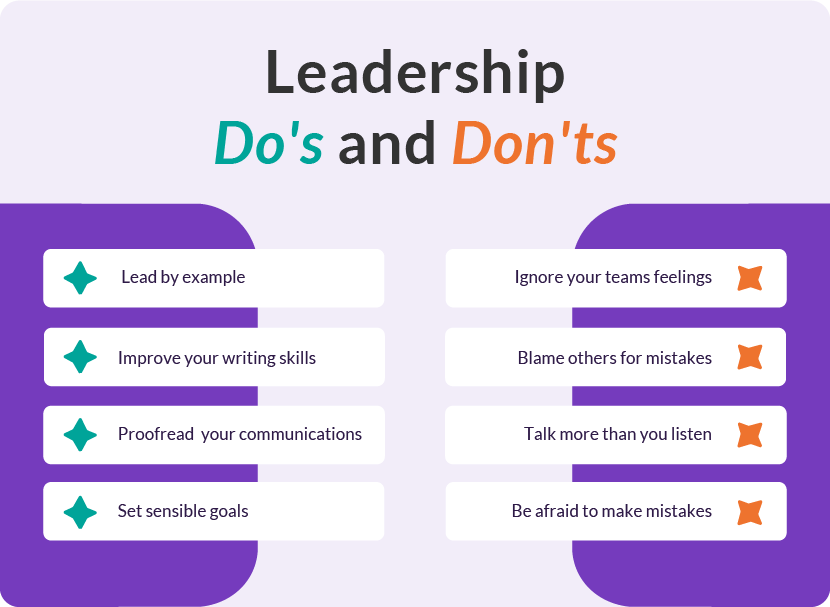Table of contents
Good leadership is the cornerstone of any successful business. You want to ensure that you’re offering useful and helpful leadership to your team, but you’re not sure where to start. For HR leaders, this gets even more tricky as you’re expected to set an example for the entire organization. Achievers Workforce Institute (AWI)’s 2023 research on manager effectiveness found that on average, only one-third of HR leaders say that their company does a good job of supporting managers to be better leaders. If you’re looking for some help, here are some do’s and don’ts of leadership that every effective leader should know.

How do you develop your leadership skills?
1. Get a coach or mentor
Great leaders need mentors too. When people have mentors or role models that they look up to, they are more likely to say their career is fulfilling, according to a research by Gallup and Amazon which found 68% of people with role models compared with 51% of those without one. Seeking a mentor is one of the best ways to build meaningful relationships and grow your professional network. Leaders can get stuck in leadership challenges while working with their teams or making an important decision, and having a coach or mentor can help them get fresh perspectives to tackle those challenges and achieve their goals.
2. Understand leadership styles
All leaders question their own leadership style. A person’s leadership style determines everything from how they make decisions to how they work with people in their teams. Gartner research on leadership found that only 29% of employees believe their leaders to be human leaders. The human aspects of leadership include components like authenticity and empathy, and leaders should focus on these factors to develop trust and build meaningful relationships with employees. One important way to become a human leader is creating a culture of recognition at work. When employees get recognized by the managers, they are more likely to say their managers have empathy and care for them.
3. Identify your strengths and weaknesses
Gallup identifies self-awareness as one of the key qualities of an effective leader. A good leader understands their leadership role, invests in their strengths to improve performance, and delegates tasks that empower their employees to succeed. Most importantly, when leaders develop their strengths, they inspire others to do the same. This requires them to turn inward, ask questions to explore their potential, and be open to feedback from teammates.
What should a good leader do?
Do: Lead by Example
You’ll be asking your team to maintain a high standard, so make sure that you’re giving the same effort as they are. Make sure you’re in on time, pull your weight, and do your share of the work. It’s much easier to respect someone who will happily pitch in with everyone else. You’ll also have a better idea of what it’s like to work on a project, so you’ll be more realistic in your requests.
Do: Improve Your Writing Skills
Most of the communication that happens in the workplace is now through the written word. After all, how many more emails do you get now, compared to phone calls? Therefore, your writing skills are very important. Without them, you can’t effectively lead. If you feel you need some help improving your skills, try using a writing tutoring service such as The Business Writing Center, or grammar websites like State Of Writing and Via Writing. If you’re based in the UK, try one of my personal favorites, UK Top Writers. For Australian readers I recommend Best Australian Writers.
Do: Proofread your Communications
You’ve got to be clear in all the communications that you make. Your team should be able to read an email and know exactly what you need from them. This means that whatever you’re sending, you need to proofread it first. To be a good leader, you should make time to proofread these communications. If time is too tight to do this, you can enlist the help of professionals. Proofreaders at services like EliteAssignmentHelp or BigAssignments can help when you need them to.
Do: Set Sensible Goals
A good leader can balance the needs of a project with what the team can realistically accomplish. If you want to excel as a leader, you need to understand what your team can reasonably accomplish, and track how well they succeed in hitting your targets. That way, you can help them increase their successes and output.
Do: Be Prepared
Good leaders are always thinking about the future, and looking for options that may become available to them. If you’re keeping one foot in the future, you can take advantage of opportunities as they arise, and be prepared for any issues that come your way. They also take advice from others, including their team, about what they think should be done to plan in advance.
Do: Be Optimistic and Positive
“Your attitude will rub off on your team. Think about it. Who will make you feel better about coming to work: someone who’s downbeat and pessimistic, or someone who’s upbeat and excited about the job at hand? A good leader knows that they set the tone for work,” says expert Benjamin Davids at Academized. “The more they work to raise their team’s spirits, the better that team will do.”

What shouldn’t a good leader do?
Don’t: Talk More Than you Listen
Some leaders are under the impression that what they have to say is more important than anything else. In fact, the opposite is true. A good leader is more of a facilitator, bringing together everyone else’s ideas and making them work in unison. Aim to listen more than you speak, and you’ll get much more done with you team.
Don’t: Isolate Yourself or Your Team
Some leaders try and keep their team separate from the rest of the organization, as they feel they can do it all. They may also isolate themselves from their own team, out of a sense of self-importance. Doing this means that they’re missing out on help and key information from other workers, and actually weakening their own team.
Don’t: Be Afraid to Make Mistakes
If you’re afraid to make mistakes, your team will be too. This means that they’ll take less risks, get less done, and contribute less than they would have otherwise. It’s much better to work to the best of your ability, and when the mistakes happen, learn from them and move on.
Don’t: Ignore your Team’s Feelings
There’s an attitude in some businesses that emotions should be kept out of the workplace. To an extent, this is true, but everyone has feelings about every aspect of their work. It’s a bad idea to dismiss any of your team’s feelings offhand. Make time to listen to them, and act on them if necessary. Remember, the members of your team aren’t robots.
Don’t: Blame Others for Mistakes
If things go wrong, bad leaders blame the issue on their team without looking at the bigger picture. This causes resentment, and things can quickly turn sour. Instead, look at what everybody could have done better, including yourself. Ask for feedback from your team and use the lessons learned to improve in the future.
Don’t: Take Credit for Your Team’s Successes
If your team does well, don’t take personal credit for it. Many of your peers will see through it, and your team will resent you. Instead, it’s much better to give credit where credit is due. If you take the time to credit your team, they’ll appreciate it.
Great leaders recognize their teams frequently
Making your employees feel seen and valued is part of becoming a great people leader. Keep the dos and don’ts above in mind, and don’t forget to recognize your employee frequently. Our 2024 State of Recognition report found managers to be the foundation of a culture of recognition at work to increase employee engagement and well-being. Read our report to understand how managers can take a step further in their leadership role with frequent recognition.


Find out what makes an online employee recognition platform effective.
Get the 2024 Recognition Report
